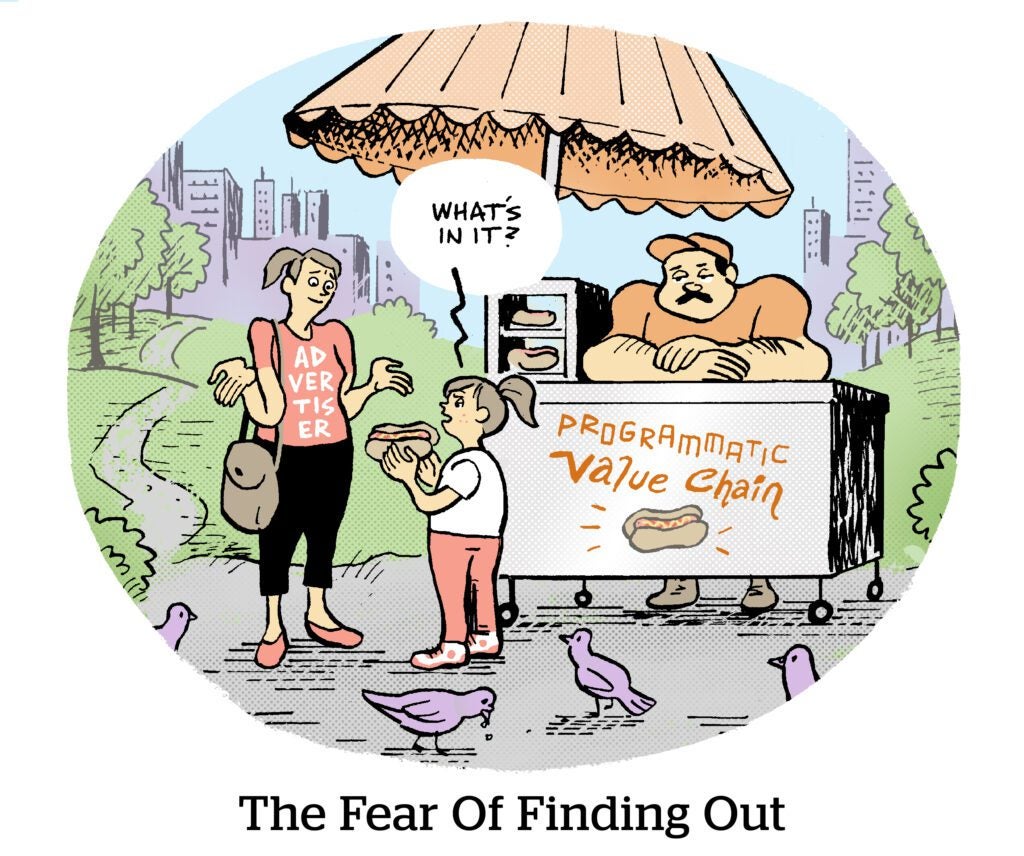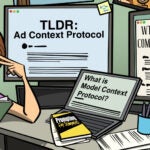Here’s today’s AdExchanger.com news round-up… Want it by email? Sign up here.
Ad Tech? What Ad Tech?
One refrain from Google when it defends its third-party ad tech business is that ad tech is a minuscule contributor to Google’s revenue. Which begs the question: Why not get rid of it?
But Google won’t quit ad tech, despite strong pressure to do so, The Wall Street Journal reports.
Ad tech might be a tiny wedge of the Google revenue pie, but the rest of the pie squeezed its way in through that wedge. In other words, Google ad tech is the best way to drive revenue to YouTube and Search. For instance, Performance Max, the new go-to gadget in Google’s ad tech toolkit, automatically serves ads across Gmail, Maps, Search, YouTube and the Google ad network.
It also makes sense why Google avoids talking about ad tech (especially when a politician is around).
When Apple CEO Tim Cook is asked about advertising, he practically pretends not to have heard of it. Last week, during Apple’s earnings report, an investor asked about the fast-growing, multibillion-dollar advertising business.
“Our specific advertising business is not large and relative to others and so forth,” was Cook’s only guidance. “But we don’t release the exact numbers on it. But it’s clearly not large.”
Privacy Pact
Television measurement is a messy jumble of data – imagine the worst-ever tangle of cable cords. Which means there’s a big opportunity for the data owners and cleaner-uppers.
Privacy-safe audience matching tools, such as the clean room software provider Blockgraph, are the next step in TV attribution, said David Kline, president of Charter-owned Spectrum Reach, at Paramount’s Addressable Now summit in New York City. (Though, Blockgraph is co-owned by Charter, Comcast and Paramount.)
And Kantar, which operates a panel-based TV measurement service, announced that its data match rate is 10 times higher since a Blockgraph integration.
TV measurement has historically been limited by its reliance on probabilistic data (aka panels), Rob Katz, Kantar’s VP of product and strategic partnerships, tells AdExchanger. But between signal loss on one side and advertisers’ increasing data requirements on the other, Katz says that matching modeled panel data with deterministic data is the best way to scale reach and measurement.
Can I Get A Little ‘Accredit’ Here?
You’re probably already sick of hearing about brand safety and social media. Well, too bad, take your medicine.
Twitter is grappling with brand safety concerns since Elon Musk’s acquisition and stock delisting. But Meta actually has positive news on the topic, having secured a Media Rating Council accreditation for content-level brand safety on Facebook, MediaPost reports.
The accreditation covers Meta’s direct monetization controls for Facebook, meaning ads that are placed directly within content, such as in Instant Articles or instream video. It does not cover ads placed within news feeds.
The accreditation also applies only to content in certain languages. Facebook instream video is covered for 26 languages (including English), while Instant Articles are covered for eight languages (also including English). One more box checked: The MRC’s criteria included the Global Alliance for Responsible Media’s Floor and Suitability Framework.
Meta received the accreditation after a two-year audit of Meta’s brand safety solutions. (Two years!)
And the timing couldn’t be better for Meta, which needed some good news after its rough Q3 2022 earnings report.
But Wait, There’s More!
Why Semafor CRO Rachel Oppenheim is going against the trend with direct-sold ads and event sponsorship revenue pillars. [Digiday]
Twitter will offer blue check verification for an $8 monthly subscription. [Bloomberg]
Emplifi acquires the commerce and content marketing company Pixlee. [release]
Paramount restructures ad sales with a focus on agencies. [Ad Age]
You’re Hired!
In-housing agency Oliver promotes global chief inclusion officer Amina Folarin to CEO. [Campaign]
Sports sponsorship platform Relo Metrics hires Jay Prasad as CEO. [release]












